Mereformasi Sekolah -Konsep dan Praktek Komunitas Belajar
Manabu Sato (2013)
PELITA/IDCJ
(Buku Original: Gakko o Kaikaku suru –Bahasa Jepnag- Diterbitkan Oleh Iwanami Shoten Tokyo 2012)
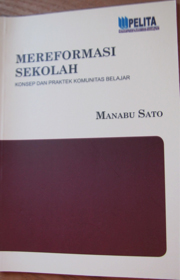
Dialog dan Kolaborasi di Sekolah Menengah Pertama -Praktek Learning Community
Masaaki Sato (2012)
PELITA-JICA
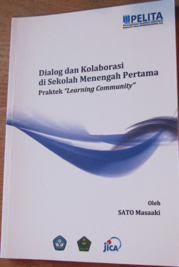
Buku Petunjuk Guru Untuk Pembelajaran Yang Lebih Baik
PELITA-JICA Team (2009) PELITA-JICA
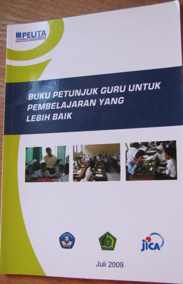
A Study of the Partnership between Schools and Universities to Improve Science and Mathematics Education in Indonesia
Saito, Eisuke; Imansyah, Harun; Kubok, Isamu; Hendayana, Siumar
International Journal of Educational Development, v27 n2 p194-204 Mar 2007
Abstract
This paper examines what kinds of impacts a school-university partnership has on schoolteachers and university faculty members, and what types of challenges and tasks exist. The results show the following: (1) joint lesson planning, observation, and reflection, called piloting activities (PA) have succeeded in improving teaching methodologies; (2) faculty members and teachers generally regarded the students under PA as being more participative; (3) it is necessary to ensure linkages between materials and students, as well as between students; and (4) PA resulted in the development of collegiality within schools and between faculty members and teachers.
Initiating education reform through lesson study at a university in Indonesia
Educational Action Research, Volume 16, Issue 3, 2008
Eisuke Saito, Paidi Hawe, Suratsih Hadiprawiroc & Sukirman Empedhe
pages 391-406
Published online: 28 Aug 2008
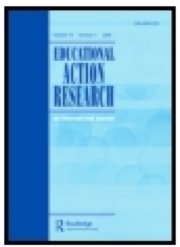
Abstract
This paper analyses the issues involved in promoting lesson study in an Indonesian university, based on a case study of the Faculty of Mathematics and Science (FMIPA) of the State University of Yogyakarta. Five points are discussed. First, conducting lesson study with schools revealed that the faculty managers noticed the ignorance about lesson study in FMIPA and decided to conduct lesson study by themselves to learn more. Second, despite using a didactic teaching approach initially, more faculty members began using group work in their lessons. Third, despite the emphasis on the importance of observing students’ learning realities, most faculty members focused on teaching methodology. Fourth, in terms of reflection, they could be classified as evaluation‐minded in order to be critical about the observed lessons, and learning‐minded to appreciate the observed lessons. Fifth, the strong involvement of managers is necessary to develop lesson study as a daily teaching and learning practice.
Teacher learning through lesson study in Indonesia (4th Chapter)
SUMAR HENDAYANA
Realising Learning: Teachers’ Professional Development Through Lesson and Learning Study
Edited by Keith Wood, Saratha Sithamparam
Routledge, 2015
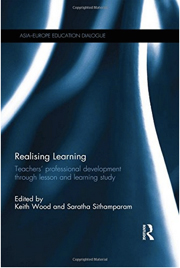
Preface
This book is an attempt to go deeper into the theory and practice of lesson and learning study to ask what has been achieved, and what could be achieved, as this originally Asian form of professional development traverses the globe and is adapted and transformed on that journey. Lesson study in its original Japanese form appears to make heavy demands on teachers’ subject knowledge, so much so that in some places it is being supplemented by the import of Japanese materials, curriculum and expertise to support its use. In one adaptation originating in Hong Kong an explicit theory of learning developed in Sweden has been incorporated in lesson study with a change of name to learning study. Lesson and learning study as a form of professional development for teachers conforms to our experience of best practice. It is classroom focused, is driven by data from teachers’ study of their own students’ learning and it is intended that it be sustained through teacher ownership of the process and the outcomes. But how does this work in different cultural contexts within Asia and from Asia to Europe? Lesson study in Indonesia is different from lesson study in Singapore, although both draw heavily on the Japanese model. Brunei has both lesson and learning study models in operation. Hong Kong learning study draws on the same theory of learning as Swedish learning study. The theory underpinning lesson study is not so explicitly stated as it is in learning study. Lesson study appears to lend itself to supporting a range of differentially driven national initiatives. In Japanese lesson study a research lesson is developed, tested and improved. Hong Kong and Swedish learning study has been described as a form of clinical research. There are strong similarities between all forms of lesson and learning study and action research. It has been suggested that learning studies have the potential to transform teaching and learning through pedagogical research. The impact of lesson study has been investigated using randomised controlled trials. Learning study, it has been argued, provides insights into the nature of the object of learning that are capable of generalisation. Our idea for this book was to find out more about how lesson and learning study are working out in the major centres of lesson and learning study activity, all of which have or are about to host the World Association of Lesson Studies international conference. From an examination of the similarities and differences in the practice of lesson and learning study in different countries we aimed to show what emerges as critical for their success as modes of professional development.
Development of INSET model for improving Teacher Professionalism in Indonesia
Sumar Hendayana, Faculty of Mathematics and Science Education Indonesia University of Education
NUE Journal of International Educational Cooperation Volume 2, 97-106, 2007
Sejarah perkembangan Lesson Study/ History of Lesson Study Development
Oleh/by Sumar Hendayana dkk
Lesson study in Indonesia: an Indonesia University of Education experience
Tatang Suratno (Primary School Teacher Education, Indonesia University of Education – Serang Campus, Banten, Indonesia)
International Journal for Lesson and Learning Studies, Vol. 1 Iss: 3, pp.196 – 215, 2012
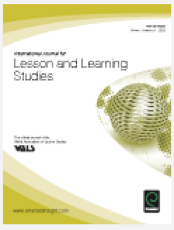
Abstract:
Purpose
Since its introduction in early 2000s, lesson study has been viewed as a promising and powerful approach to professional development and school improvement in Indonesia. The purpose of this article is to discuss the historical development and unique perspective of lesson study at Indonesia University of Education.
Design/methodology/approach:
Through a systematic review of the related literature to analyse practitioners and official point of views regarding adaptability and sustainability of the lesson study effort, the author portrays the progress and challenge faced by practitioners of lesson study in Indonesia. The author also points out its “existence proof” through the “story of adaptation” in order to describe the “steady change and improvement” and the “local proof route” in practice.
Findings:
The review shows consecutive changes that started from reforming student learning, teachers’ learning and empowering the learning community, though reaching the core of instructional improvement is indeed challenging.
Originality/value
In this paper there are two substantial lessons learned, i.e. teaching practice and reflective practice are explicated to underlie the proposed framework of substantive aspects of lesson study. Key factors are also highlighted to develop further a valuable and sustained teacher education and development in Indonesia.





